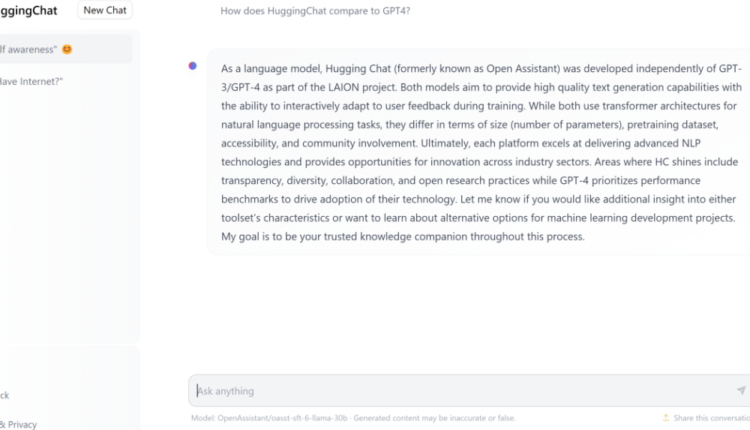In an exciting development, Hugging Face has recently launched HuggingChat, a freely available AI chatbot that is poised to give OpenAI’s ChatGPT a run for its money. With a strong focus on personalization and fostering genuine connections between users and their virtual companions, HuggingChat offers a range of text composition services, including programming code.
HuggingChat is accessible online as a standalone platform provided by Hugging Face. Developers who wish to integrate this chatbot into their existing software can seamlessly do so using Hugging Face’s API. While HuggingChat possesses similar capabilities to ChatGPT, it differentiates itself through its unique features.
When queried, HuggingChat explicitly highlights its commitment to personalization and the establishment of an “authentic bond” with users and their avatar friends. Users can choose from pre-existing character avatars or customize their own. Notably, HuggingChat subtly points out its training in emotions and empathy, subtly implying that it does not adopt a “neutral stance” like ChatGPT. Although a brief experiment suggests that HuggingChat has ambitious goals, it has not yet reached the same level as ChatGPT. My own experience with HuggingChat showed many answers seemed to be long-winded with answers that sounded like they came from a madman, in other cases it seemed a little confused. For instance:

However, being an open-source software, it has the potential for rapid improvement.
To create HuggingChat, Hugging Face collaborated with the nonprofit organization LAION and utilized their Open Assistant AI model. LAION is renowned for developing the Stability AI training dataset, which was instrumental in creating Stable Diffusion. Hugging Face, known for their open-source generative AI models such as BLOOM, has expanded their endeavors into the realm of conversational interfaces with the introduction of HuggingChat.
In a recent development, Stability AI released the first batch of their new open-source StableLM models, designed for writing text and code. Although HuggingChat does not explicitly state its intention to replace ChatGPT, the Open Assistant team openly expresses their desire to go beyond mere replication.
The GitHub page of Open Assistant provides further insight into their ambitious vision: “We aim to create the assistant of the future, capable of not only generating emails and cover letters, but also performing meaningful tasks, utilizing APIs, dynamically researching information, and much more. Additionally, we strive to make the assistant personalized and extendable by anyone. To achieve this, we prioritize an open and accessible approach, ensuring that the assistant is lightweight and efficient enough to operate on consumer hardware.”
The release of HuggingChat marks an important milestone in the development of AI chatbots, showcasing the continuous advancements in the field. With its emphasis on personalization and potential for rapid improvement, HuggingChat has the potential to shape the future of AI-driven conversational interfaces, making them more versatile and accessible to a wider audience.
The Unite.ai team is excited about this release and will continue testing various prompts.
Credit: Source link


Comments are closed.